“The pathology results have come back from the tissue we removed during your surgery and, I’m so sorry, but it has come back as malignant. I have been in contact with the Alberta Children’s Hospital in Calgary, and they are expecting you tonight or tomorrow morning to start talking about your treatment protocol and to start testing…”
Those are the words my mother and I heard the afternoon of September 2, 1994 — the second day of grade 10 for me — and our whole world changed forever. So many things hit at once. When you receive a cancer diagnosis, you have no time to adapt to what’s going on because you are undergoing all kinds of testing, while your parents are filling out endless paperwork. Emotions run so high during this time — confusion, sadness, shock, anger, denial, and of course, fear. You are never physically alone through that horrible day of testing, but you are emotionally and often physically naked in front of a world of strangers. Scans, biopsies, surgeries, pokes, new foreign objects being implanted in your chest, toxic chemicals and radiation being pumped into your body in order to save your life. And for my family, we had lots of travel back and forth from Medicine Hat to Calgary. Trying desperately to make medical personnel listen to you to tell them what is going on in your body and in your head — but you are a kid — what do you know?
I was supported by great parents who had my back and let me weigh in and make my own decisions regarding treatment on my soft palate to remove the rare rhabdomyosarcoma that I presented with that September evening at Alberta Children’s Hospital. My parents took my doctor at his word and had me in Calgary by 8:00 that same evening. I was told to eat well and get lots of sleep because I was going for lots of tests the next day — and was I ever tested! Every kind of scan and test was performed on me on that long day and I was so tired and sore, but this day was nothing compared to what was to come for my family and I. There were multiple surgeries scheduled to remove the cancerous tissue, margin by margin. A central venous access line was inserted into my chest to administer endless medication. We were taught how to maintain that piece of tubing, which went through my chest, close to my right breast, and through the jugular vein and into my heart. The CVA line was frightening because it went directly to my heart. I was scared that if it came out or an end came off in my sleep, I might bleed out and not know it. They made sure that we knew the dangers of the treatments, but we ultimately learned that CVAs are very safe. Treatment protocols were discussed and I turned down the offer to participate in a study on new chemotherapy protocols despite lots of pressure from the medical team. Ground being firmly established on both sides, chemotherapy commenced, and my world became Hell every three weeks for the next 48 weeks — nearly an entire year of highly toxic chemicals being pumped into my little body to try to save my life. Physical feelings — discomfort, negative reactions, transfusions, immune-suppression, nausea, vomiting, diarrhea, constipation, exhaustion, insomnia, and worlds of pain — constant aching, shooting pains, building pains — all over my body but nothing compared to the Cyclophosphamide headache. Imagine the worst migraine you have ever had — now multiply it by 10 and endure that for over two hours with the drug running through the CVA and straight into your heart. My poor mother did her best with cold washcloths and all the comforting her hands could give me.
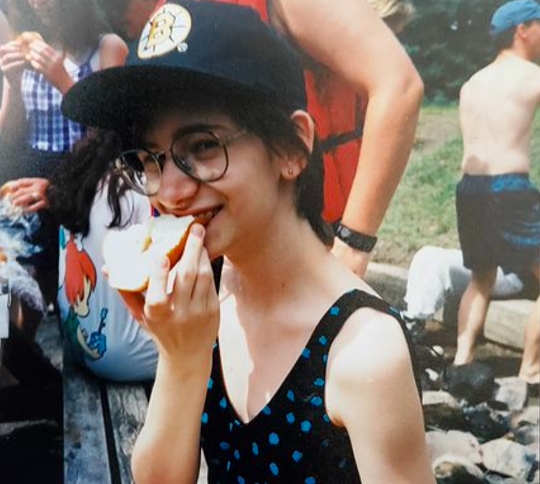
My treatments finished in 1995 and I met lots of great people from different organizations related to the cancer community, which was in its infancy compared to where it is now. Childhood cancer is openly shown and discussed now, but it was not as much back then. We were working to change that. The Canadian Cancer Society – Medicine Hat branch reached out and asked if I would be their poster child for 1996 and 1997. I would be doing media interviews, appearing at events and making speeches — a challenge for me as my cancer was soft palate and I now had a cleft palate from a stitch removed too soon. I did this volunteer work as I was able during my treatment and recovery. I did lots of appearances at schools, talking with kids and learning what they thought cancer was and where they got their information from and what I could do to change those misperceptions. While working with the women at the Medicine Hat office, I got to know them well and they listened to my story. They told me they knew of a way to help me recover from the emotional trauma of cancer. I had lots of support from my family and my Medicine Hat team but there is something inherently lonely about going through a cancer journey — especially then when it was not really talked about publicly.
No one understands what you are going through — except another patient or a survivor your own age. Enter Christine Wandzura (McIver now) and Camp SunMaker, recommended by the staff at the Canadian Cancer Society. They gave me forms to complete, and after my mom and I filled them in, they sent them off for me. They got me in just under the deadline for the 1996 camp season! I was in for an amazing experience, but I had no idea at the time how influential and profound that experience would be for me. How it would shape me for the rest of my life.
The summer of 1996 found me heading to Calgary again, but for a positive experience this time and not with the usual fear, anger, threats, and pain I normally travelled that long stretch of the TransCanada Highway. This time, I was meeting up with other cancer patients and their siblings who were attending the camp that week. I was nervous, because when I was on active treatment, I had not been given much freedom to mingle with the other patients in Calgary. I hadn’t really met many of them. I wasn’t used to being away from my mother, even though I was 16. I was nervous because she has always been my biggest supporter on every level. Mom — emotional supporter, defender, and medic. I knew there were medics assigned to each group at camp and that all medical requirements were being met, but its so hard to leave that rock and routine you know so well and with which you are so comfortable. I hadn’t realized until that moment how “institutionalized” I had become in the medical world and how dependent on my mom I now was. This is one of the reasons cancer is so hard on teens. You lose all of the independence you gained before diagnosis and become totally dependent again. I met up with another girl my age (Mandy) and she introduced me to others she knew from previous years, and we all ended up being part of the same cabin team! I couldn’t believe how many kids were in that room waiting for the buses to arrive to take us out to the camp!
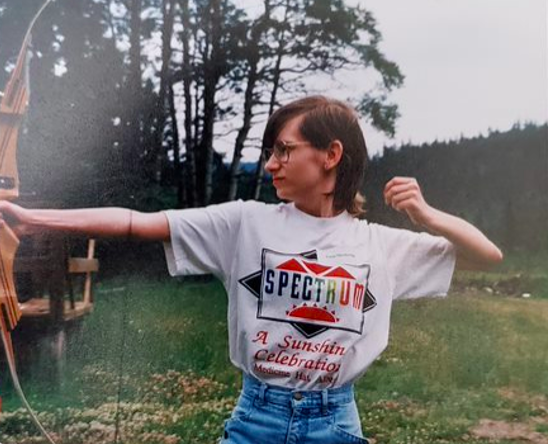
Christine and her staff and volunteers did such a great job, making sure we knew who our medics were and ensuring we felt comfortable asking our counsellors about anything that was going on. As cancer kids we had to have confidence that our medical needs were being looked after, before we could truly begin to enjoy our experience, cut loose and have some fun like the kids that we were.
Those who had siblings at camp were able to see their family at any time they needed to, but if they were different ages and in different cabins, they were able to get that little bit of independent time they may need.
There were great experiences at Camp SunMaker. At that time, it was held at Camp Horizon near Bragg Creek and the setting was gorgeous to this prairie girl — coniferous trees everywhere I looked! We had good weather for the most part and on the poor-weather days we were able to do a lot of alternative indoor activities, so we weren’t sitting around. We banded together and supported each other, and for the first time, I could talk about my experiences to people who truly understood what I had been through because they had been through similar experiences too. They knew the fear, the anger, the pain and they knew the fight. They knew people who had fought and made it. They knew people who had fought and died. I came to the camp as a newbie and when they held the Night to Remember during campfire at the beginning of camp, I chose to stay behind and rest in my cabin. I didn’t know anyone yet and I wasn’t quite comfortable going to something so deeply personal. Although I was assured I would be quite welcome, I was able to listen and it touched me so deeply to hear those kids say the names of those who couldn’t come back this year or ever again. I thought of those I knew who hadn’t made it and when the other girls came back to the cabin, they saw me sitting on my bed and they came over to hug me because they knew what I was feeling. That hug shattered the newbie feeling for me and I was now one of the pack and we went on to take care of each other. That week we camped out, played games and song wars and climbed rock faces. I was afraid of heights, but when a one-legged girl challenges you to climb, you gotta’ do it! We also did the low ropes course. Today, one of my life’s regrets is chickening out on the high ropes course. We experienced a sweat lodge and the amazing therapy of just learning the meditation techniques that went with it. We also went on a raft trip and learned to trust each other and work as a team. I can’t swim and am not the fondest of water, but I did it and had such a great time! And we spent so much time just being with each other, sharing our experiences. Every kid at that camp gained something in their spirits and their characters. The last day of camp came when everyone had to go home and there were so many tears because no one wanted to leave each other. We knew that some of us would never come back.
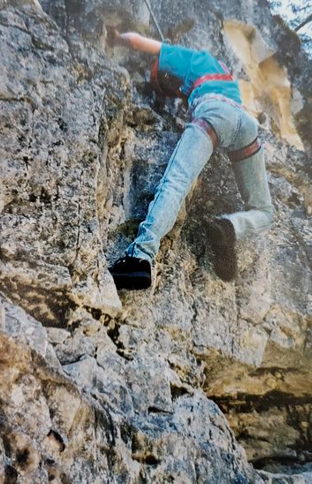
From that camp on, I drew on the confidence I gained from being around other people my own age who knew what I had gone through and from being challenged to face my phobias and triumphing over them. I saw other kids who had gone through even worse treatments than I had and I was inspired by their courage and determination. I saw children who never gave up because they didn’t understand the meaning of not surviving and they kept digging in to live. More importantly, I saw those same kids, who came in on the first day of camp as scared, tired, sick and weak cancer patients, get back on those buses and leave as rejuvenated, stronger, happier and laughing children — not as cancer patients, but children as they should be. This was entirely due to the time and effort put in by the staff and volunteers at Kids Cancer Care. I always wanted to go back to the camp as both a camper and eventually a camp counsellor, but life had other plans for me and it never happened.
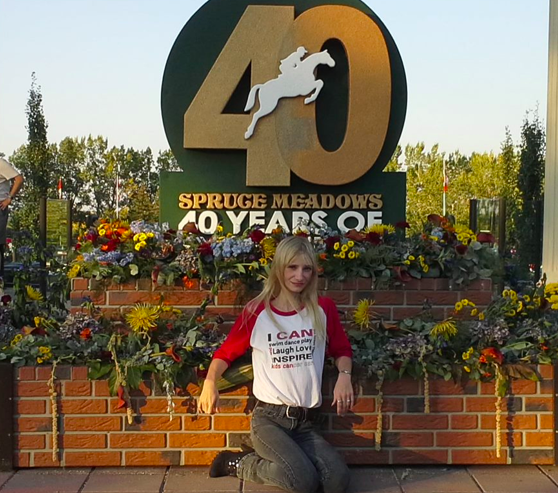
In 1999, just after my 19th birthday, I relapsed and fought through 18 more weeks of hard chemo, followed by seven weeks of “lighter” radiation. I knew how to reach out to other patients now because of my experiences at Camp SunMaker, so it was easier for me to deal with it this time. I even managed to keep my status as a part time college student during my chemo treatment, thanks to things I was taught at the camp. After college, I began to work, and you know that you never get to go back to your youth, once you start that first post-graduate work — but I always wanted to.
Over the years, I have lost friends and family to this relentless nemesis called cancer, but thanks to people like Christine McIver and all the people involved with her vision of Kids Cancer Care, I developed new confidence and skills to cope with these issues and I learned how to face each battle. I developed a support network of other cancer kids to talk to for support by being at Camp SunMaker for ONE WEEK! Now Kids Cancer Care has their own camp site and there are so many new programs for all ages happening on a regular basis! I can only imagine how strongly supported today’s cancer kids and their families feel. With Kids Cancer Care, they now have a constant beacon of light around them to help raise them above the dark waters of treatment that feel as though they are grabbing your legs and sucking you into the dark cold and the loneliness of treatment. When you are at the lowest point of treatment, blood cell counts are down, you are in low nadir, admitted to hospital, often in isolation and you can’t sleep because of the nausea and pain. Things are so weirdly quiet on the ward late at night; a person feels a sense of solitary confinement so much more during that time. Family has had to go home or to their temporary accommodations and the nurses check on you sporadically when they aren’t engaged with high critical care patients who need them a bit more often than you do at the moment. It’s just you and that damn ticking clock on the wall. But it wasn’t that way after I’d been to camp. I now had friends to think about to help me through those lonely times and I could look back on those happy memories I shared with them. Camp SunMaker taught me different ways to look at things. It even helped me to look at the things I really didn’t want to look at. This gave me the strength in myself to get through those tough surgeries and treatments. By choosing to help and counsel other patients, by teaching them what I learned and by helping them connect with the networks, I got through my own tough times.
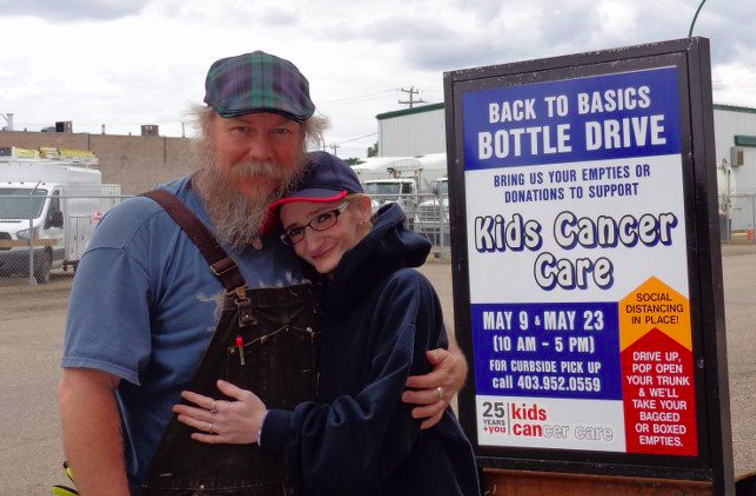
Today I face a different battle with cancer and thanks to those Kids Cancer Care connections, the confidence that the camp experience gave me and the tremendously unique support network to which I have access, I know I will win it in my own way. My cancer journey has been long and difficult and is now coming full circle for me. I am now 40 years old as of the writing this, and I have been diagnosed with cancer for the fifth time. Cancer is not messing around this time. Cancer wants my life, and it wants it bad. I have been diagnosed with squamous cell carcinoma in the tongue, throat and lymph nodes under my left arm. The severe radiation they administered back in 2012 to save my life the last time, caused so much damage to the tissues in my neck and throat, that any potentially life-saving surgeries would likely fail. I have had so much chemotherapy that I am over lifetime dosages for most drugs. I have had enough radiation for three lifetimes. All treatment options are out. I am terminal. I am dying. But I am dying on my own terms. I know what I want. Cancer wants to take me and wear me down to that non-human looking withered husk, but I am not going to allow that to happen to me.
Canada has the Medical Assistance in Dying (MAID) Program. I choose when I have had enough, not cancer. I win. I will die still being who I am, and a big part of who I am today, started back in 1996 when I met Christine Wandzura (McIver) and had the pleasure of experiencing her incredible vision of her son Derek’s legacy—the Kids Cancer Care Foundation of Alberta. Christine and her team use donated dollars to the very last digital penny to ensure that the children and families her organization helps, gain the skills, strength, support and confidence they need to face their cancer journey with the same fierceness and determination that I was inspired to draw on when I was 16. I had already been through treatment once before I went there, but I went through it feeling that unique sense of aloneness, like no one truly understood what I was going through. My camp experience erased that feeling, so I could fight for more time and help others do the same. Her staff not only takes care of the physical needs of the kids in their care, but they gently support these kids and their families where they need it the most — in the heart and the spirit. Without these two pieces of our souls being uplifted and nurtured, a cancer kid can’t hope to win. Sometimes we need to get away from being a cancer patient and just be a kid — camps do that, day programs do that. If you look at pictures of, or have the good fortune to attend, one of their Dad and Daughter Gala events and you get to see the happy smiles of a little girl or young lady dancing with her Dad proudly beaming down at his brave girl enjoying her special night in her fairy-tale princess gown, you will see the true magic of Kids Cancer Care and what Christine McIver started in her son’s memory so long ago. You will see true love of life and the hope of a future where kids can just be happy, healthy kids and cancer patients nevermore. The network of souls that make up the happy places these kids envision as a bright safe haven to get through the worst of times is the Kids Cancer Care Foundation of Alberta founded by Christine McIver. It is her son Derek’s legacy.
If you have children of your own, give them a big hug tonight because a person never knows when life will change without warning and go from everyday normal to a nightmarish battle. The feelings and experiences I have shared are from my heart and I genuinely wish everyone health, happiness and inner peace in their lives. Thank you for the valuable time you have spent reading my words.
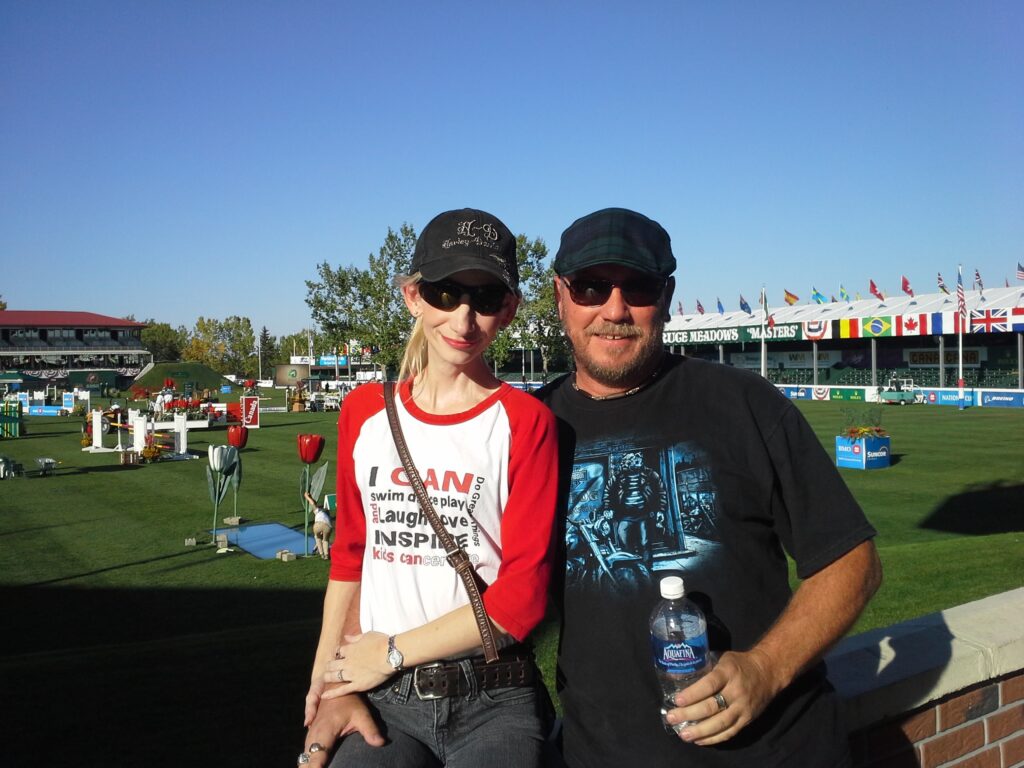
Tiana Shoebridge passed away peacefully on July 9, 2020. She was one of our first campers. We are so appreciative of all the fundraising and awareness activities she took part in to improve the lives of children affected by cancer. She most recently supported us in our Medicine Hat Bottle Drive in 2020, which raised $15,000. We are deeply grateful to Tiana’s loving partner Colin Binding, who generously donates to our Derek Wandzura Memorial Scholarship Fund every year. Colin’s donations are used to top up scholarship awards for deserving childhood cancer patients and survivors. We call it Tiana’s Top Up and will forever hold her in our hearts. Although she is no longer with us, Tiana continues to offer hope to young people affected by cancer by helping them to pursue their dreams through post-secondary education.
“It may take my life but it won’t take my legacy and my legacy is to take away its power by getting people to raise money and fight back by getting their stories out there.” – Tiana (Shoebridge) Binding














